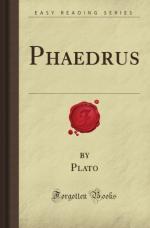|
This section contains 1,373 words (approx. 5 pages at 300 words per page) |

|
SOURCE: "Phaedrus," in The Cambridge History of Classical Literature, edited by E. J. Kenney, Cambridge University Press, 1982, pp. 624-26.
In the essay that follows, Goodyear highlights Phaedrus's choice of style and attempts to explain his stature as an obscure poet.
Phaedrus holds no exalted rank amongst Latin poets, but he claims serious attention by his choice of subject matter and his individualistic treatment of it. He was, as far as we know, the first poet, Greek or Roman, to put together a collection of fables and present them as literature in their own right, not merely as material on which others might draw. And on this collection he firmly imprinted his own personality, complacent, querulous, cantankerous. In prologues, epilogues, and occasionally elsewhere he reveals his grievances and aspirations. His fables contain elements of satire and 'social comment', not at all gentle: if he had chosen to write satire...
|
This section contains 1,373 words (approx. 5 pages at 300 words per page) |

|


